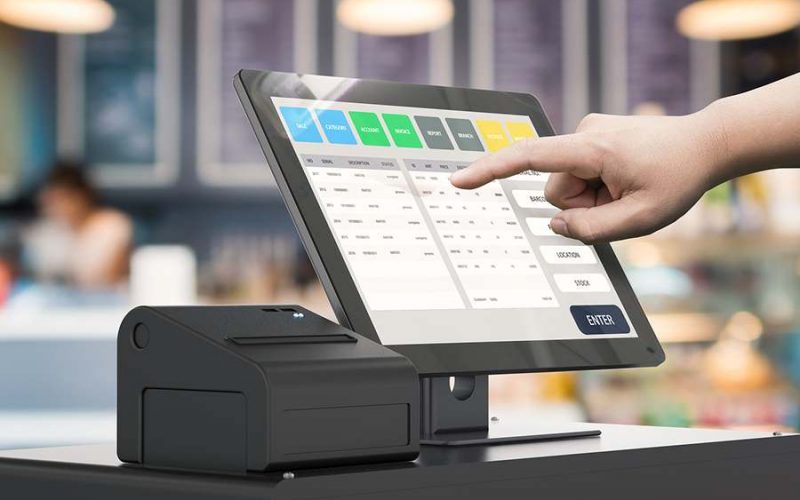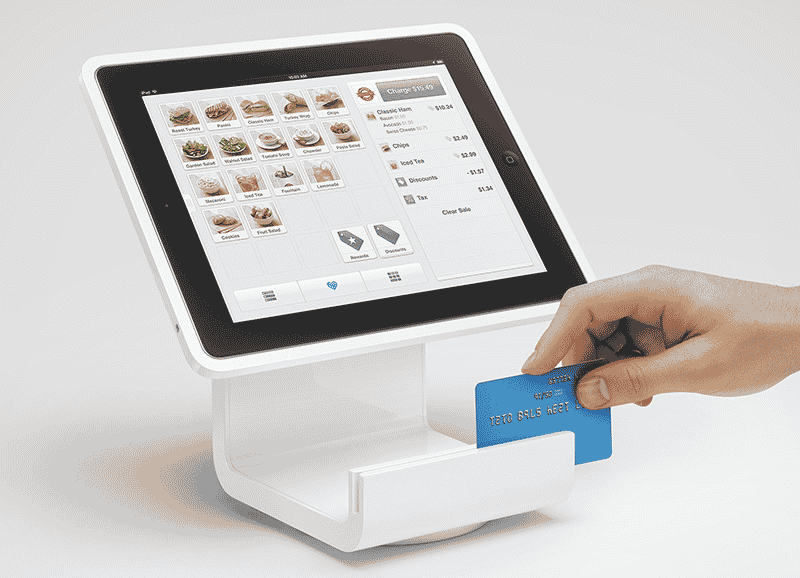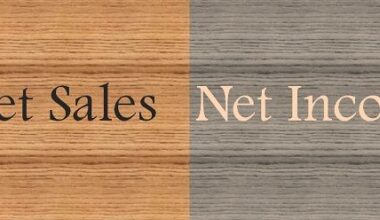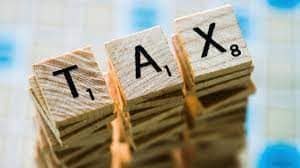Although some independent retail businesses rely primarily on high-tech point-of-sale systems, classic cash registers can still be beneficial to small businesses. Cash registers are often inexpensive and simple to operate. They also provide some basic reporting functions to assist you to stay on top of your bookkeeping and have a longer lifespan than POS systems that must be continuously updated. Let’s look at the things you have to consider when choosing a cash register machine-like Casio for your small business. We have also compiled the best 10 cash registers for small businesses.
What is a Cash Register?
The term “cash register” is defined as “a business machine that typically has a money drawer, displays the amount of each sale, and records the amount of money received.”
A cash register records all transactions that take place in your store, generating a record of the money that comes in and goes out. It can also compute and apply taxes, generate receipts, and provide basic sales tracking. Cash registers are used at many large grocery stores and retail stores.
James Ritty, a whiskey, wine, and cigar trader, devised the cash register in 1879 as a prophylactic measure against staff theft. And, while we’re sure employee theft was much more prevalent back then, it’s still a worry for stores today. According to National Retail Federation data, staff theft is the second-leading cause of shrinkage for business
Since their early prototypes, cash registers have come a long way. We now have electronic cash registers, which are ubiquitous in eateries. While a basic cash register is designed to handle cash transactions, newer models include more advanced features.
Cash registers are often only a few hundred dollars, but if you want additional features like credit card readers, barcode scanners, or scales, you’ll need to invest in additional hardware.
5 Things to Think About When Buying Cash Registers for Your Business
Cash registers are a must-have for any product-based business that handles a large number of transactions daily. Cash registers can range from a basic with minimal functions to a sophisticated point of sale (POS) system with a vast list of features, depending on the demands of the business.
If you’re attempting to decide which sort of cash registers are best for your business, we’ve given a few points to think about before purchasing to ensure you get the system that’s ideal for you.
#1. Consider your size and requirements.
The first item to evaluate is the current size of your business and its planned expansion over the next few years. Perhaps you have thousands of things in stock across multiple departments. You may also run a much smaller firm with only a few hundred things in stock and a small retail area.
It is critical to comprehend what you see for yourself now and soon so that you can determine what your system requires.
If your business has a big number of products, invest in a full POS system that includes a barcode scanner and product codes to speed transactions. Because of its scalability, this system is also an excellent choice if you anticipate considerable growth soon.
If you have little inventory, only a few transactions, and fewer overall needs, a simpler cash register would usually suffice. Small Business Chron prices their lower-end equipment between $100 and $1,000, but they can go up to $20k!
#2. Examine the security features.
It is always a worry to keep cash, cheques, and electronic payment information secure. As a result, it’s critical to check for some basic security features.
A lockable drawer prevents unauthorized individuals from gaining access to cash and cheques. You may also want to consider placing a cash drop box nearby to safely keep big sums of money. This will keep the cash in your register from reaching a particular quantity, which can deter both internal theft and robbery.
A password option will also prevent unauthorized users from using the cash register and accessing critical consumer payment information.
#3. Check the advantages you have with your inventory tracking.
If your business just has a small amount of inventory, basic cash registers should suffice. Otherwise, when dealing with significant volumes of inventory, you may profit from a more comprehensive POS system that includes an inventory tracking capability.
This will automatically track daily transactions so you always know how many things you have on hand. Rather than completing manual inventory counts, this function can save you time and keep you from running out of a specific product.
#4. Think about your receipt printing alternatives.
Another consideration is whether to utilize a thermal or print ribbon cash register. The initial cost of a thermal printer is higher, but it can save money in the long run. You don’t have to buy new ink cartridges all the time because they print receipts with heat. A print ribbon printer is less expensive upfront, and the lettering on receipts is sharper, but ink cartridges are more expensive.
#5. Determine whether you want to purchase from a retailer or a vendor.
Shopping at a retailer is usually your best chance when looking for a basic cash register with limited features, and you may be able to find a great register locally. Otherwise, a quick search on the internet should offer a plethora of possibilities. Some business owners will even shop secondhand and purchase used models at even lesser pricing.
If you’re searching for a complex POS system, it’s best to buy from a provider directly. They should provide a variety of packages and pricing options to meet the needs of your business.
Pay attention to these tips to assist you in selecting a cash register that meets both your company’s needs and budget. Following deployment, you should notice better efficiency in daily operations as well as faster checkouts. This means increased productivity and happy consumers because transactions can be completed without issue.
Best Small Business Cash Registers
A cash register is an operating system that incorporates a safe cash box, an advanced adding machine, and a receipt printer. Many are compatible with credit card terminals and barcode scanners, and others include inventory and point-of-sale (POS) software for enhanced functionality.
The following are the top cash registers for small businesses:
- Square: Ideal for individuals, entrepreneurs, and small businesses in need of a POS system.
- Casio PCR-T280: The most affordable portable cash register
- Casio SR-C4500: Recommended for extensive product lists and cloud reporting.
- Sharp XE-A207: Ideal for businesses who want to connect register data to QuickBooks.
- Lightspeed: Recommended for high-volume or multi-location merchants and restaurants.
#1. Square: The Best All-In-One POS Cash Registers for Small Business
Square is an all-in-one solution that incorporates credit card processing, software, and cash register POS hardware into one system. Unlike the other register options on our list, Square’s POS register does not allow you to compare merchant account providers. Square’s payment processing, on the other hand, is ideal for small businesses, with straightforward flat-rate costs and no starting or monthly account fees.
Features of the Square POS Cash Register
- Sales and checkout: Touch-screen and barcode entry, credit card and contactless payments, cash and check recording, discounts and coupons, open tabs, split payments, add tips, and view real-time sales reports on any device are all supported by registers.
- Mobile sales: Install Square POS on several smartphones and tablets to make transactions on the sales floor, at tables, at events, or at the curb.
- Taxes and reporting: Taxes are automatically tallied according to predefined procedures.
- Interconnectivity: Without an internet or cellphone connection, you can record sales and process credit card payments. Connect as many registers and store locations as you like on any device. Real-time data synchronization and reporting are provided via cloud-based technologies.
- Receipts: Attach a receipt printer or send digital email or SMS receipts with possibilities for collecting client feedback.
- Inventory management includes storing detailed product lists, adding products to sales, automating inventory modifications, and synchronizing inventory with an online store.
- Employee management includes unlimited staff logins as well as tracking sales by staff for commissions. Options for incorporating payroll processing.
- Customer management entails saving contact information for customers and tracking sales by customer.
Pros
- Cloud-based software that is free
- Hardware that is reasonably priced and offers payment plans
- It has more functions than a standard cash register.
- Setup is quick and easy, and payment processing is built in.
Cons
- A cash drawer must be purchased separately.
- Because payment processing is built-in, you can’t shop around for better rates.
Square POS Cash Register Pricing
- $169 for a square stand, or $16 every month for a year. iPad stand and card reader (iPad sold separately).
- Square Register costs $799 or $39 per month for 24 months (Fully integrated POS register with touch-screen monitor, customer-facing display, and card processing terminal).
- Square Terminal costs $299 or $27 per month for a year (All-in-one portable credit card machine with POS software and receipt printer built-in).
- Mobile device registration: For $49.50, use your own smartphone or tablet and attach a contactless, chip, and swipe card reader.
- Payment processing costs 2.6 percent plus 10 cents each chip, tap, and swipe transaction, or 3.5 percent plus 15 cents for manually keyed-in purchases. Payments for ecommerce and invoices are 2.9 percent + 30 cents.
#2. Casio PCR-T280: Best Low-Cost Portable Cash Register
If you only need a simple cash register to complete payments wherever you sell, the Casio PCR-T280 electronic cash register provides an excellent range of sales capabilities for less than $100. It also weighs 11 pounds, making it portable. This portable Casio cash register, which is available on Amazon and through most office and retail supply firms, has an established track record of consistent performance for temporary market sellers and small merchants alike.
Unlike the build-your-own cash registers from the POS systems on our list, you don’t need to buy a separate cash drawer and receipt printer with an all-in-one cash register device. To process credit cards, however, you will need to add a separate terminal from your merchant account provider. This model does not include a connector for a built-in credit card terminal.
Casio PCR-T280 Cash Register Features
- Sales and checkout are quick and simple, with a convenient change tray on top. The back customer display shows the amount, and coupons and discounts can be manually input. Cash and check payments should be recorded, and transactions should be separated. Returns and exchanges should be handled manually.
- Taxation and reporting: Four tax rates can be pre-programmed. Throughout the day, print daily sales totals.
- Offline mode: There is no need for an internet connection. There are no possibilities for connecting to other registers or store locations.
- Inventory management: You can enter up to 1,200 products and prices, but there is no stock tracking.
- Employees: eight user logins, sales tracking by user.
Pros
- Low-cost and portable
- Cash drawer and receipt printer are built-in.
- Reputation for dependable performance
- Cash register system that is simple and straightforward to use
Cons
- There is no integrated card payment processing.
- There is no internet or cellphone connectivity.
- It has no consumer data management.
- There are no tab or tip functions.
Pricing for the Casio PCR-T280 Cash Register
Casio PCR-T280 cash register costs $129.
Payment processing will necessitate the establishment of a separate merchant services account. Rates will differ.
#3. Casio SR-C4500: Best Cash Register for Large Product List Businesses
The Casio SR-C4500 is a significant jump up in capability from the bare-bones PCR-T280 discussed previously. The SR-C4500 costs just under $500, which is a significant price increase, but it comes with a slew of new features. The SR-C4500, in particular, can store up to 7,000 item prices, compared to the PCR-1,200, T280’s making it perfect for retailers with big product lists.
It also includes an integrated barcode scanner and credit card terminal, a user-friendly, spill-resistant keyboard with configurable fast buttons, commission tracking for up to 50 users, and guest check tracking for hospitality businesses.
The Casio SR-C4500 is marketed as an all-in-one cash register with a linked cash drawer and two built-in receipt printers. It also includes two connections for connecting a barcode scanner (available separately) and a credit card terminal (usually obtained through your credit card processing provider).
Casio SR-C4500 Cash Register Specifications
- Sales and checkout: A 72-key flat programmable keyboard allows for quick transactions. To scan and record up to 3,000 pre-programmed items, connect a serial scanner. Save up to 50 detailed visitor checks (for restaurant and hospitality businesses), print thermal or journal receipts, manage refunds, and perform age verification for restricted products such as alcohol.
- Taxation and reporting: You can set up to four tax rates. View sales activity, sales by employee, and hourly sales, and save reports immediately when you start daily close operations. To see and store sales reports, save reports to an SD card in CSV format or use Casio’s Connect ECR+ free mobile app.
- Internet access is not required to operate the cash register, but it is essential for credit card transactions and linking to the mobile reporting app. There are no choices for multi-register or multi-location configurations.
- Casio Mobile App: Install the Casio ECR+ app on your smartphone and pair it with your cash register through Bluetooth. Allows you to access your cash register records stored on Casio’s cloud database from anywhere.
- Inventory management: You can program up to 7,000 goods or PLUs in total, including condiment and hash item programmability.
- Employees: Count up to 50 clerks, keep track of commissions, and conduct a training mode.
Pros
- Cloud reporting and Wi-Fi technologies (Android and iOS compatible)
- Up to 7,000 products/PLUs and 200 departments are possible.
- Keep track of up to 50 guest checks.
- Mode of training
Cons
- Pricey
- There will be no price variations (BOGO, etc.)
- There is no bottle deposit.
- No tax-exempt key.
Pricing for the Casio SR-C4500 Cash Register
- The Casio SR-C4500 costs $479.
- $199 for a barcode scanner
- $207 for a laser barcode scanner
- Credit card terminal costs $495 and is compatible with the PAX S300 integrated EMV terminal.
Processing fees vary according to the type of merchant account you have.
#4. Sharp XE-A207: Best Cash Register with QuickBooks Integration
The Sharp XE-A207 lies between the two Casio registers covered in this guide in terms of features and pricing. It does, however, provide something that these and many other low-cost cash registers on the market do not: a link to your QuickBooks Pro software. You may use this to directly integrate your sales data into QuickBooks to expedite your bookkeeping and utilize QuickBooks to manage business chores like inventory monitoring, purchase orders, and business reporting.
It’s worth noting that the majority of POS-based cash registers also allow QuickBooks imports and integrations. Square and Lightspeed, for example, both feature a direct QuickBooks link. Because a QuickBooks data download is unusual in low-business cash registers for small businesses, the Sharp XE-A207 stands apart.
Sharp’s XE-A207, like the Casio devices on our list, combines a secure cash drawer and receipt printer into a single item. This cash register does not include a barcode scanner, but it does link to a credit card terminal provided by your merchant services provider, allowing you to completely incorporate credit and debit card payments into your normal checkout flow.
Sharp XE-A207 Cash Register Specifications
- Sales and checkout: An integrated credit card terminal, a huge clerk screen, and a customer display are all available. Enter discounts and coupons manually; however, there is a quick return option. Keep track of cash and cheque payments. Receipts may be printed using the built-in thermal printer.
- Taxation and reporting: Four tax rates can be pre-programmed. Calculate daily sales totals.
- Interconnectivity: There is no need for an internet connection to utilize the cash register. A link would almost certainly be required for an integrated credit card terminal.
- Inventory management: Enter up to 2,500 products and prices; however, no stock tracking is available.
- Employees: 25 user logins; sales are tracked by staff. There are no built-in commission features.
Pros
- Uploading QuickBooks
- Payment processing that is integrated
- Up to 2,500 items
Cons
- There is no barcode scanner connectivity.
- There are no pre-programmed discount codes.
- No customer data storage.
Pricing for the Sharp XE-A207 Cash Register
Sharp XE-A207: Approximately $350
Payment processing will necessitate the establishment of a separate merchant services account. Rates will differ.
#5. Lightspeed: The Best POS Cash Register for Multi-Location Retailers and Restaurants
The Lightspeed POS-based cash register provides a full set of multi-store management capabilities capable of connecting inventory, purchasing, staff, and business administration duties across many locations—it even integrates internet transactions. Lightspeed, as a POS-based register system, allows you to set up many registers in one or more locations and integrate all data within one centralized, cloud-based software system.
The typical cash registers on this list do not support connecting multiple registers or locations. So, whether you have a high-volume store or a multi-location business, you’ll need something more robust and networkable. Lightspeed is one of the better solutions for businesses of that size, and it provides excellent value for the price.
Lightspeed POS Cash Register Specifications
- Touch-screen or computer-controlled checkout screen, barcode scanning, and entry are all available for sales and checkout. For floor and tableside sales, install the Lightspeed mobile POS app on several iPhones, iPads, and Android tablets. Create discount codes and coupons that may be used by entering a code or scanning a barcode. Handle open restaurant sales tickets and tabs. Saves customer information and transaction history for easy returns. Receipts can be printed or sent via email or SMS.
- Taxes and reporting: Taxes are automatically tallied according to predefined procedures. Real-time sales and inventory statistics that are highly comprehensive and adaptable. Hundreds of pre-programmed reports. There are accounting integrations available.
- Lightspeed features a “offline mode” that allows it to continue running even if the internet connection is lost.
- Inventory management includes storing complete inventory lists, adding products to sales, automating inventory modifications, tracking parts and materials, and synchronizing inventory with an online business and numerous locations. Lightspeed also has facilities for managing product variants and bespoke orders, as well as advanced inventory reporting.
- Employees: Set up different logins with varying authorization levels and track sales by employee.
Pros
- A robust feature set that includes comprehensive inventory and reporting tools.
- Connect a number of registers and locations.
- Cloud-based system with real-time data synchronization
Cons
- Only applicable to retail, speciality, and restaurant businesses.
- The most expensive option entails continuous monthly costs.
Lightspeed POS Cash Register Pricing
- Lightspeed cash register bundles: Hardware bundles are priced on a quote basis. It is compatible with desktop PCs, laptop computers, and iPads. Connect printers, cash drawers, barcode scanners, and card readers in any combination.
- Monthly prices for POS software range from $69 to $229, plus $29 for additional registers for retail businesses. Restaurant software starts at $59 + $34 for additional registers, with add-ons available.
Payment processing: Lightspeed Payments provides built-in credit card processing. For swipe, chip, and tap payments, the rate is 2.6 percent plus 10 cents, and for manually keyed-in payments, the rate is 2.6 percent plus 30 cents. There are volume savings available.
#6. PCR-T500 Casio
This Casio cash register has all of the fundamental features needed to run a small retail business, including a cash drawer, back client LCD, and the ability to set up 40 distinct staff IDs and 25 different departments.
#7. ER-380 Sam4s
This cash register, which is reasonably priced, allows you to set up 12 distinct departments and 500 PLUs. It also includes a receipt printer, a cash drawer, and clerk IDs. Prices begin at just around $300.
#8. ER-940 Sam4s
This cash register is suitable for use in restaurants since it contains a receipt and kitchen printer to assist with order management, as well as automatic tax computation for tables and the ability to link to major POS systems. It costs around $650.
#9. SPS-520 RT Sam4s
This cash register is a fairly advanced device with a bar code scanner, card reader, touch screen display, and the option to configure 999 clerks and 99 PLU units. It’s also more expensive than many of the other options, costing around $1,150.
#10. FD130 (First Data)
This First Data product, a tiny terminal designed to work with electronic cash registers, allows you to process credit and debit card payments as well as checks. For around $180, it includes IP connectivity and wifi as a backup option.
What is the Difference between a Cash Register and a POS system?
On the surface, it appears that classic cash registers and sophisticated POS systems serve the same function: to ring up sales. While both solutions are capable of doing so, their differences are far more profound.
A cash register is a machine that keeps your cash in a drawer and allows you to speed up the checkout procedure. Meanwhile, a POS system can perform both of these things while also assisting you in running your retail business.
The most significant distinction between cash registers and POS systems is that the latter is far more powerful, resilient, and feature-rich for a business.
Take into account the following:
#1. Functionality and features
Cash registers: Allow you to ring up sales and have a secure drawer for deposits and bills. Some cash registers can be configured to meet your tax obligations, while others can just provide basic sales data.
POS systems: Enables you to do all of the above, as well as:
- Keep track of your inventory
- Collect and store customer information
- Run a customer loyalty program
- Run reports and analytics on your sales, inventory, and customers, among other things.
- Create and carry out campaigns
- …as well as a lot more.
#2. Portability and adaptability
Modern point-of-sale (POS) systems are more portable and adaptable than traditional cash registers. The latter is essentially only available in one form: a cash register machine. However, POS systems like Vend can work on a variety of platforms, including Mac, iPad, and PC, allowing you to make your checkout experience as portable or as detailed as you like.
A POS system will operate for you whether you’re ringing up sales behind a large cash counter or on the go.
#3. Integrations
Another advantage of point-of-sale systems in this situation. The majority of cash registers can only communicate with your payment processor. However, if you use a POS system, you can expand its possibilities by combining it with solutions such as your:
- software for accounting
- platform for ecommerce
- Marketing automation and loyalty software
- processor of payments
- ERP
- Apps for scheduling
#4. Price
If you’re on a tight budget, a classic cash register may be more enticing, as these machines normally cost between $100 and $500. POS systems, on the other hand, often cost $1,000 per year in addition to the cost of hardware — that is, your PC or iPad.
Having said that, a point of sale system should be regarded as an investment. While it may be more expensive, the additional features and functionality it provides can save you a significant amount of time while also assisting you in growing your business. When you get the most out of your POS system, the solution more than pays for itself.
Here’s a table that summarizes some of our main points:
Cash register | POS | |
| Price | Less expensive; $100–$800 | Around $1,000/year in fees + hardware cost. But you typically get more bang for your buck. |
| Ease of use | Easy to learn and train employees to use; has basic functions. | Modern POS systems are as user-friendly and intuitive as most mobile apps. But for users who need support, some vendors provide email, phone, and online customer service and training. |
| Reporting | Basic sales reporting. | Multiple reporting options; improved accuracy. Some POS systems also come with sophisticated retail analytics that tracks sales, inventory, customers, and more. |
| Biggest advantages | Long-lasting; reliable. | Robust, growing with your business, offers much more features and functionality. |
| Biggest drawbacks | Limited in functionality; archaic. | Typically comes with subscription fees and may require regular software updates. |
How to Choose Between a Cash Register and a Point-of-Sale System
Choosing between cash registers, POS, and mPOS for your retail business is similar to making any other key business decision: the proper answer is entirely dependent on your specific requirements. While there is no one-size-fits-all solution, the following factors and questions might help guide you through the process:
- What are my current sources of angst? Where is the source of those aches and pains?
- What types of payment methods must my business be able to accept?
- Is it necessary to collect sales tax(es)? Is it the same tax for everyone, or are there different taxes for different consumers, sales, stores, or products?
- On average, how busy is my store?
- How many departments, categories, and product SKUs must I monitor?
- How many goods do we now carry? And, how many will we be able to bear in the future?
- How many registers do we have or do we require?
- What is the status of my current customer loyalty program?
- What do my employees like and dislike about our current setup?
- How do we handle receipts for our customers?
Top 10 Cash Registers Substitutes and Competitors For Small Business
Based on reviewer data, you can discover how the cash registers compare to the competition, read reviews from current and prior users in industries such as Apparel & Fashion, and find the best solution for your business.
#1. Shopify Point of Sale
Retail point-of-sale software for integrating in-store and online sales
#2. Heartland Retail
Heartland Retail is a cloud-based solution that provides real-time data access through POS, dashboards and reporting, customer management, customer orders, inventory management, and purchasing and receiving.
#3. QuickBooks Point of Sale
QuikcBooksPOS is a QuickBooks-compatible online solution that is suited to your business’s needs, including managed inventory, online access at any time, and payments that are automatically placed into QuickBooks Online.
#4. LS Retail
LS Retail is an end-to-end retail management system that provides merchants with all of the functions needed to properly manage business operations from head-office to POS terminals, regardless of industry.
#5. Tessitura
TESSITURA SOFTWARE® is a fully integrated enterprise-wide software system for arts and cultural institutions.
#6. Sell
Vend is a cloud-based retail POS software, inventory management, eCommerce, and customer loyalty app for iPad, Mac, and PC that allows you to manage and expand your business.
#7. Retail Square
Square’s new retail POS system includes comprehensive inventory management software, a free online store, next-day deposits, and other features.
#8. Clover
Clover is an integrated suite of tools that replaces your cash register, payment terminal, receipt printer, and barcode scanner. Credit cards, EMV, and Apple Pay are all accepted.
What Is the Most Crucial Aspect of Becoming a Cashier?
Cashiers can use crucial customer service abilities including attentive listening, kindness, and decision-making in the course of their daily tasks.
Is Working as a Cashier Simple?
Because cashiers must undergo repetitive motions and mental exhaustion, their jobs may be challenging and exhausting. When certain types of customers enter the store, it makes their job even more challenging because sometimes things aren’t as clear-cut as they should be. Everyone is familiar with those types of clients.
Which Risk Factors Apply to Cashiers?
Cashiers frequently encounter risk factors such as uncomfortable posture, repetitive movements, intense exertions, and prolonged sitting. Each element has a unique relationship to the region of the body. These risk factors, which include shoulder pain, back pain, and carpal tunnel syndrome (CTS), are what lead to cashiers having ULDs.
How Does the Cashier Behave?
Being a cashier requires you to be outgoing and engage with many clients every day. When dealing with clients, at the very least, a smile, a hello, a farewell, and a brief chat are required.
Can Someone without Experience Work as a Cashier?
Since most cashier roles don’t require prior experience, it’s important to highlight your dependability and soft skills. Soft skills like effective communication, an enthusiasm to learn, and organization are the greatest ways to land a job as a cashier without prior experience.
Conclusion
Many merchants and small businesses are switching to POS-driven cash registers because they expand the number of ways and places where customers can shop and buy. Standard registers are less expensive than hand-tallying sales on a calculator and make the checkout process faster and more accurate. However, they are not connected to mobile devices, online sales platforms, or even other registers within the sales location. POS cash registers for small businesses are the greatest choice for getting a thorough hold on your checkout activities, business operations, and customer-focused sales and marketing.
Cash Register FAQ’s
How much is cash register?
A basic touchscreen cash register will set you back about $350. Higher-end models, such as those used in pubs and restaurants, may cost around $1,200. A high-end touchscreen register, such as the Casio VR 7100, will set you back more than $2,000.
What is the difference between a cash register and a POS?
A cash register is a machine that keeps your cash in a drawer and allows you to speed up the checkout procedure. Meanwhile, a POS system can perform both of these things while also assisting you in running your retail business. The most significant distinction between cash registers and POS systems is that the latter is far more powerful, resilient, and feature-rich.
What is the useful life of a cash register?
A cash register has a life expectancy of 10-15 years, with upgrades lasting 5-7 years.
- Point Of Sale Systems: Best POS System For Businesses
- Transaction Processing System: How it Works With Examples (Detailed Guide)
- How To Calculate Average Inventory- A complete Step-by-Step Guide
- ONLINE PAYMENT SYSTEMS: Top 13 Online Payment System & Software in UK
- Project Management Reporting: Examples, Software & Tools







